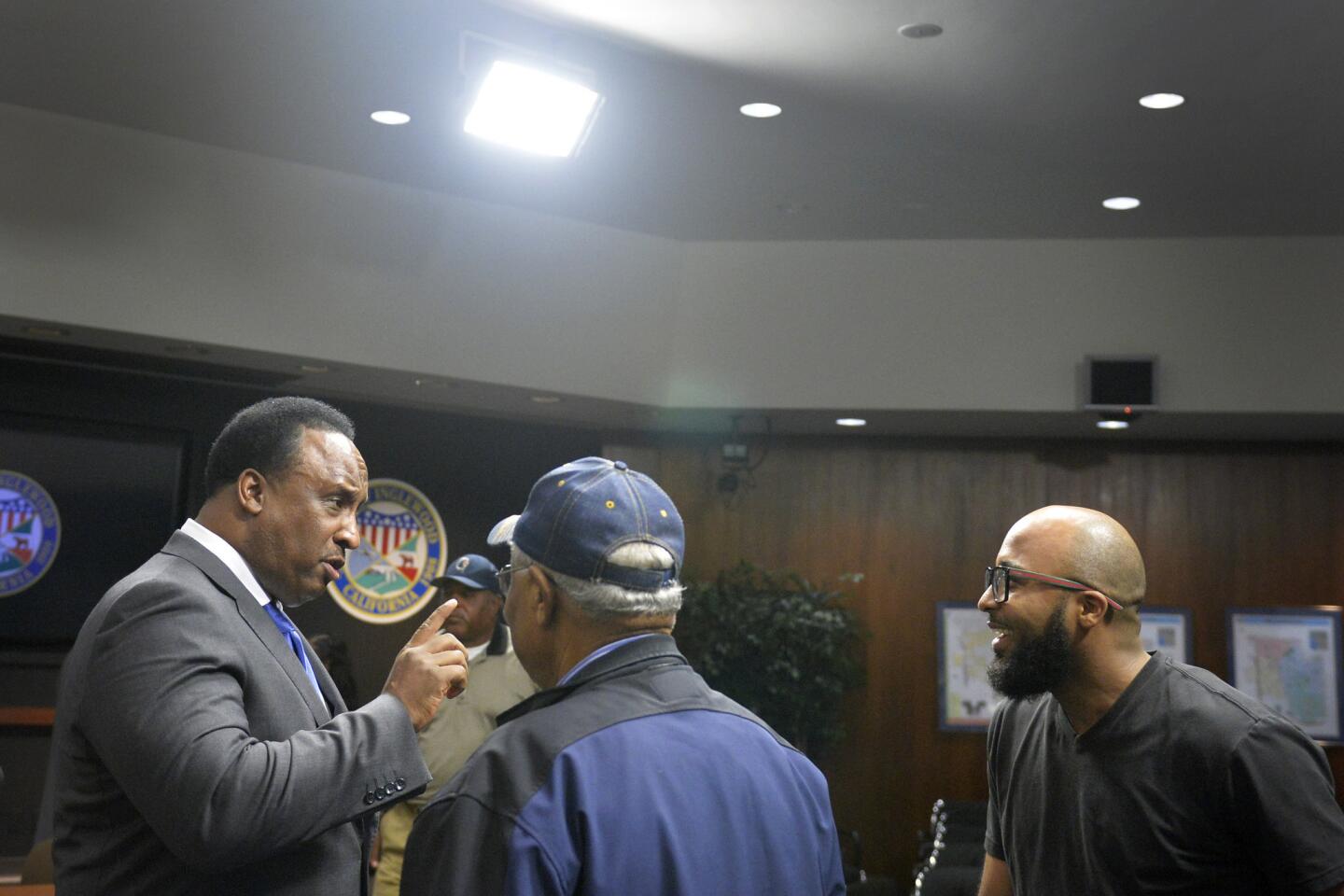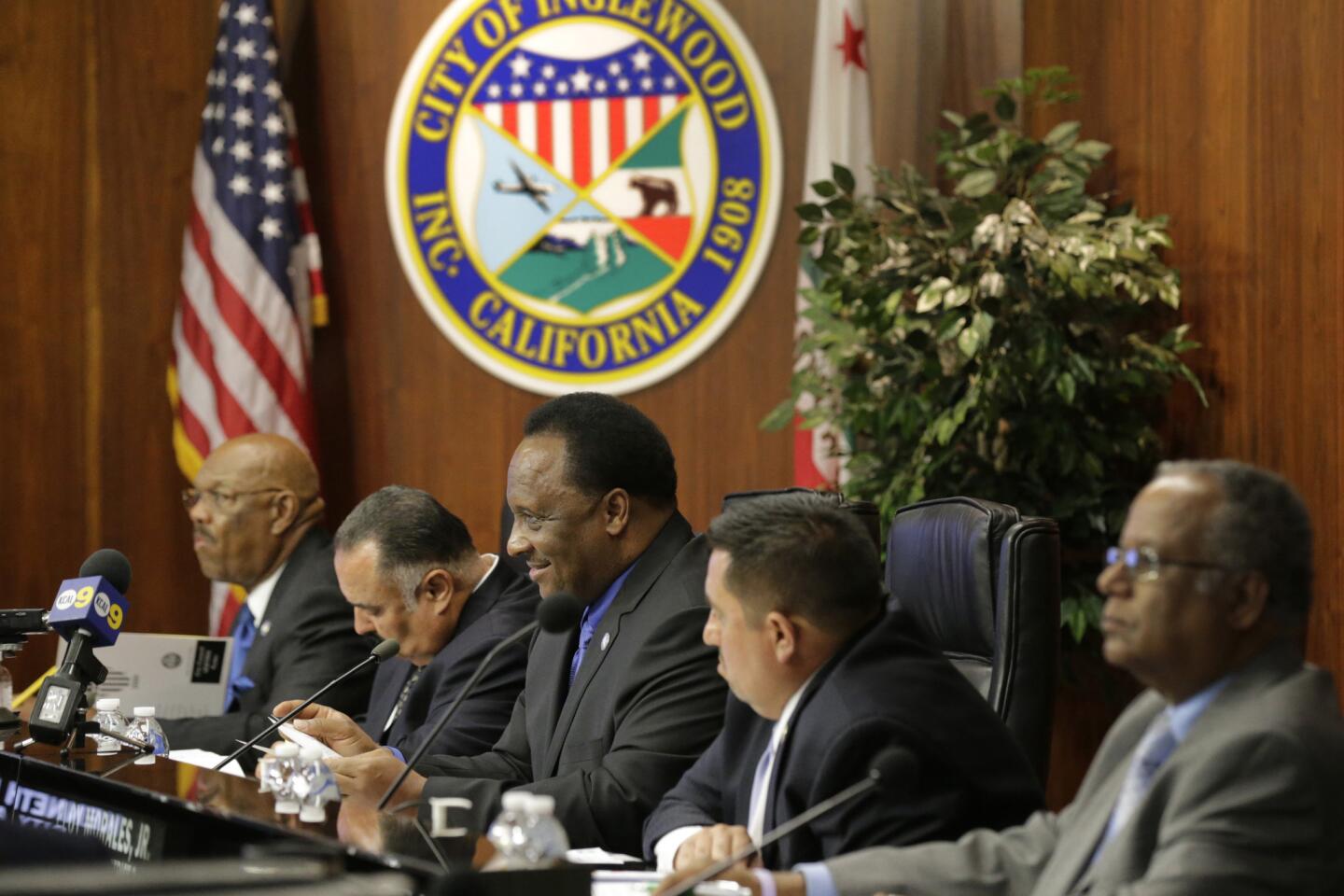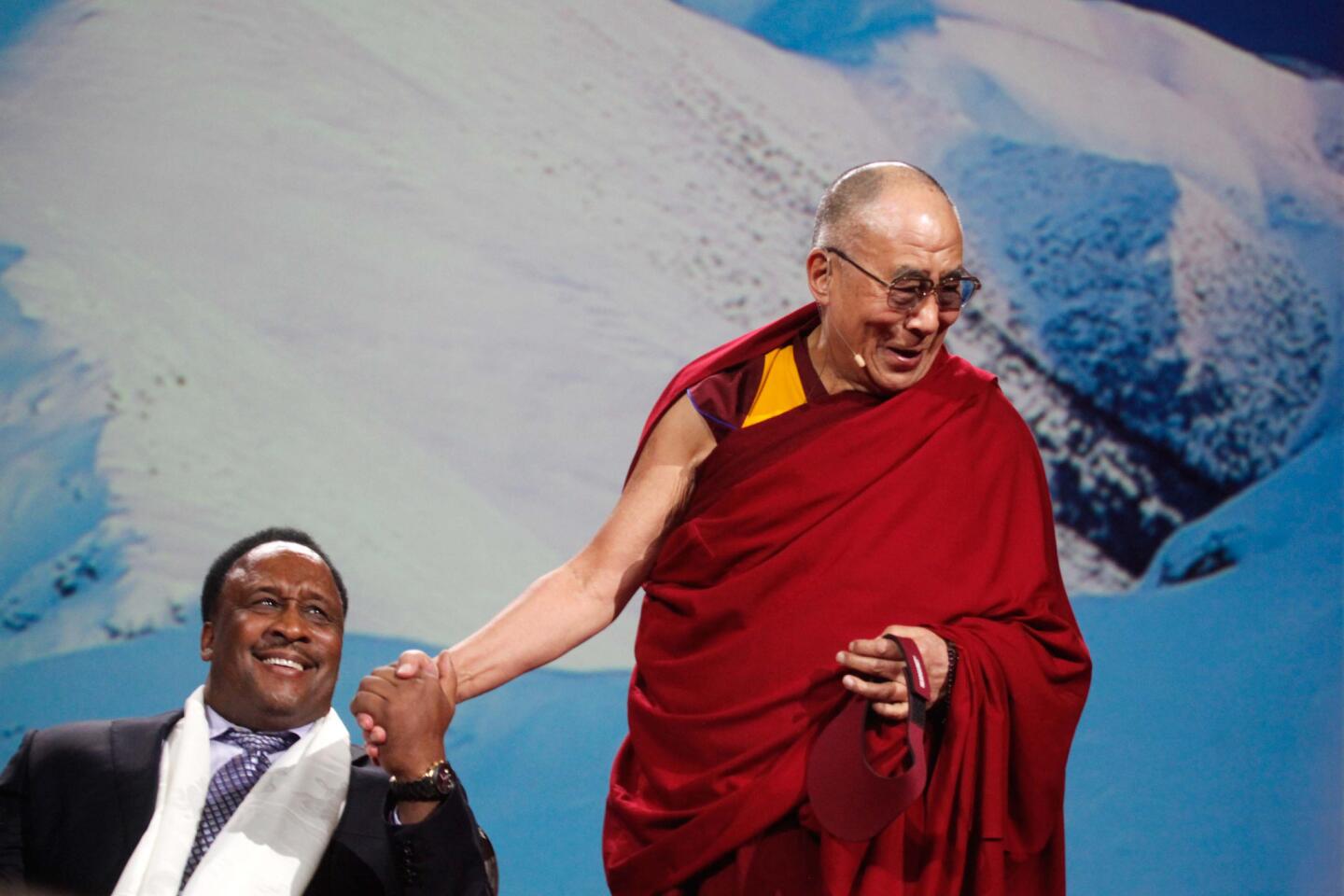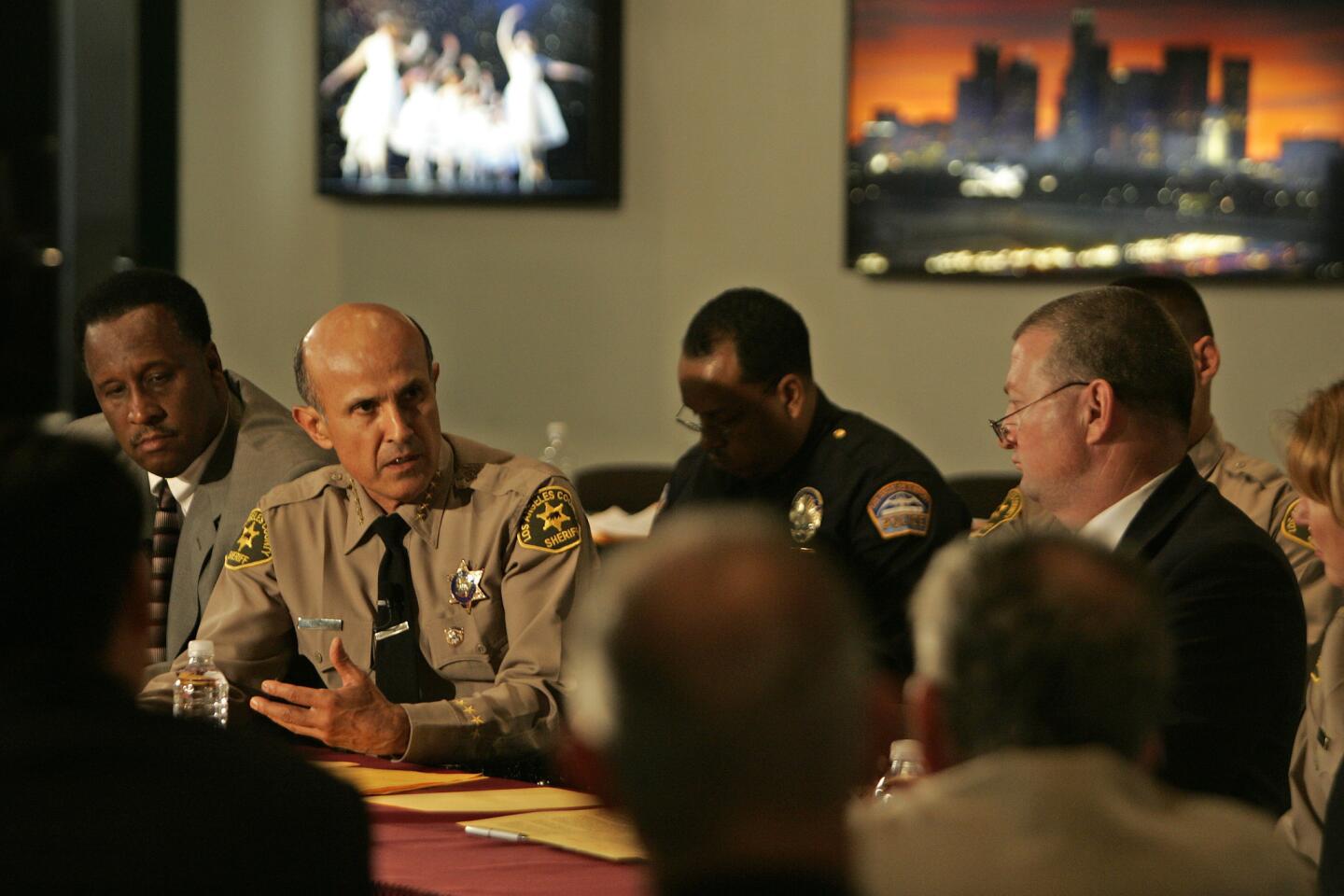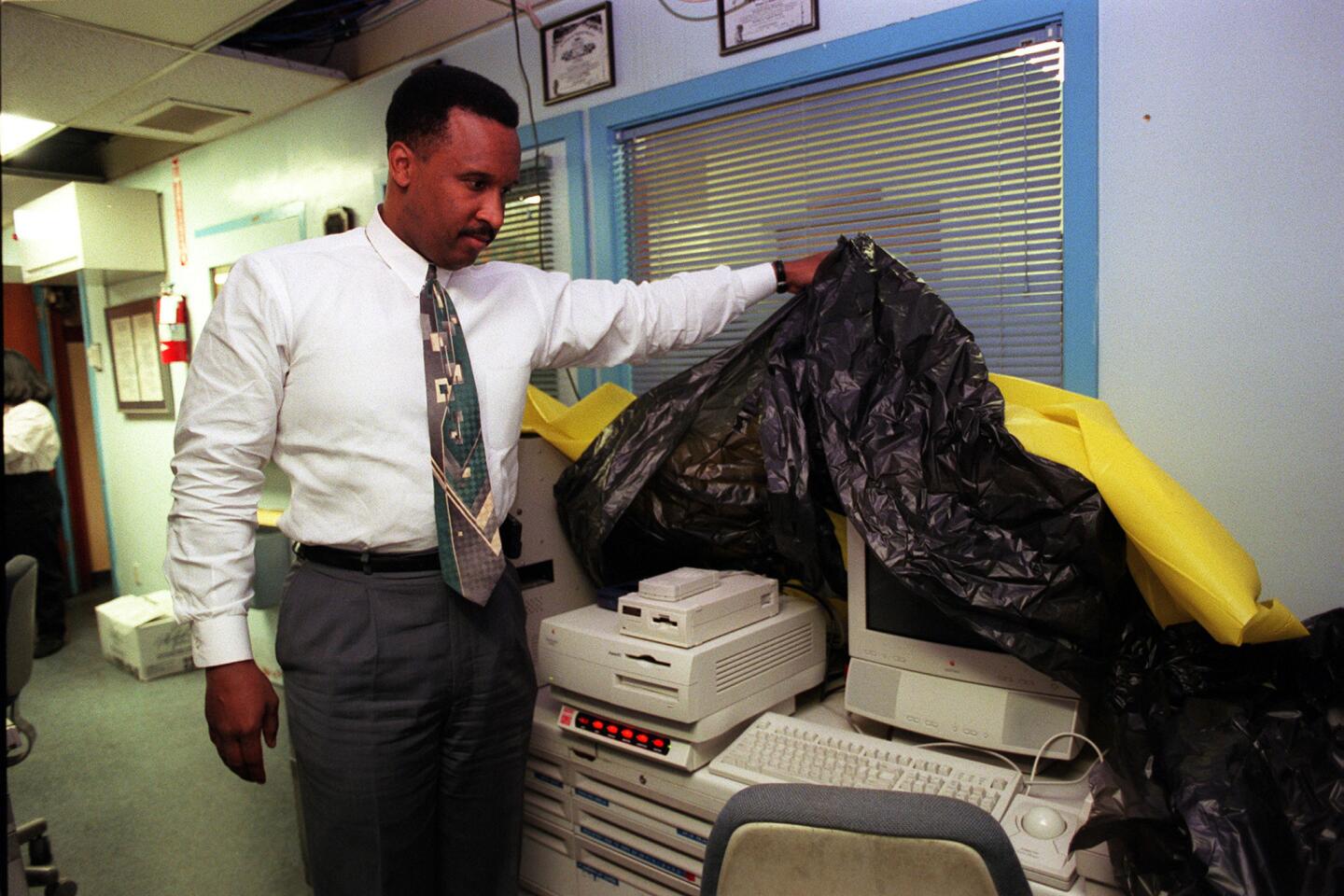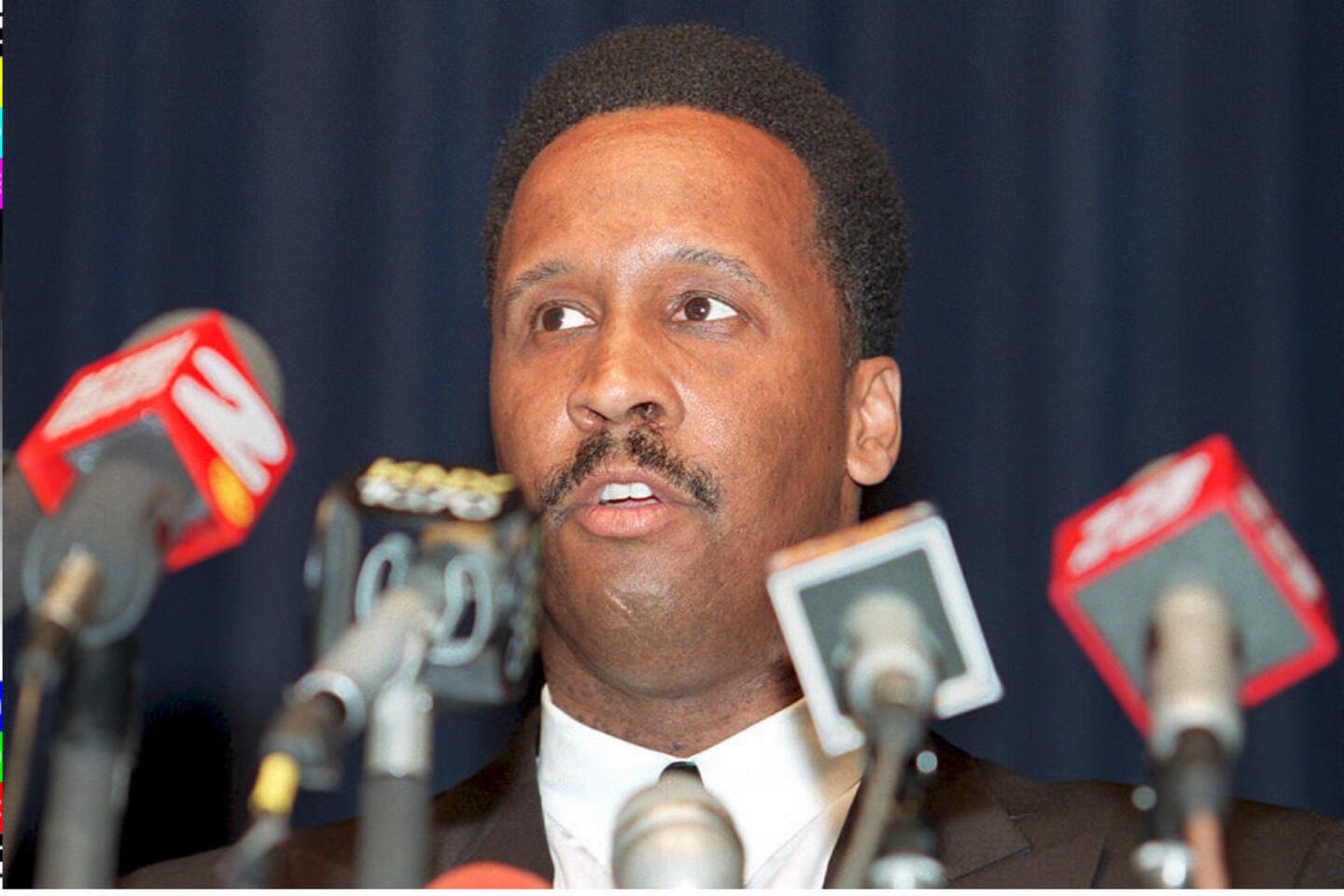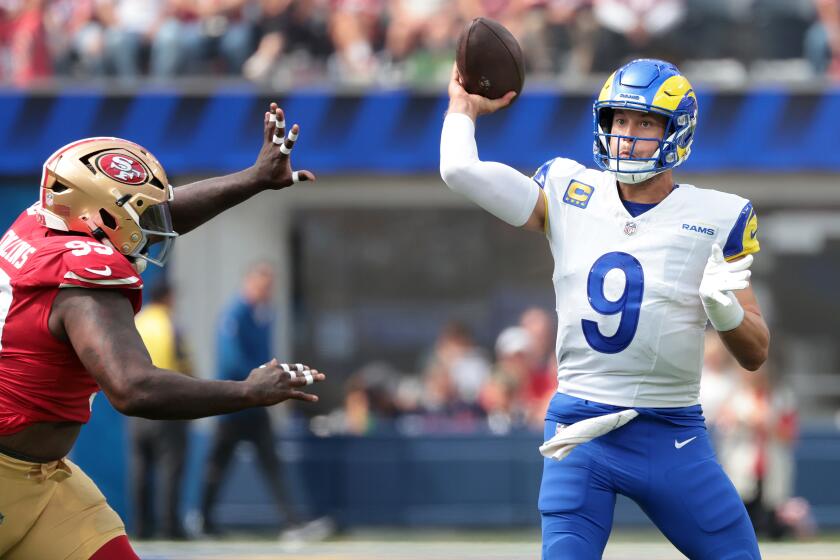Great Read: Inglewood’s forceful mayor wants people to follow his NFL lead
- Share via
For so many years, people did exactly what James T. Butts Jr. told them to do.
It works like that when you are a police chief and your officers must follow every command. But after Butts got elected mayor of Inglewood in 2011, he ran smack into a couple of City Council members who kept opposing him.
“The meetings were clown shows,” he recalls. “When you’re used to order and discipline ... it was tough to take.”
So the mayor dipped into his campaign funds, lent tens of thousands to help a businessman and a former police buddy defeat the incumbents, and created a council in which, he says, “everyone is dialed in that there is one quarterback.”
For better or worse, this approach has brought change to a city scrambling back from the verge of bankruptcy. The Forum has been revived and there are plans for commercial and residential development at the site of the old Hollywood Park racetrack.
With Butts now focused on luring the NFL to Inglewood, his forceful style might give him an edge.
Just weeks after St. Louis Rams owner Stan Kroenke and his partners announced plans to build a $1.86-billion stadium next to the Forum, Butts and his council hurriedly approved the project in February.
“Now we can celebrate,” he said.
Not everyone in the room was thrilled.
Some residents, calling for a public vote, felt railroaded by a 61-year-old mayor they describe as “intimidating” and “dictatorial.”
“He talks to us like children,” says Lynette Lewis, a regular presence at council meetings. “It’s like, ‘I’m your daddy and I’m going to run things like I want.’ ”
A bear of a man with a steely constitution and an occasional temper, Butts insists no politician can please everyone.
“When you’re driven, the upside is you get things done,” says Earl Ofari Hutchinson, a prominent Los Angeles activist whose dealings with Butts date back four decades. “The downside is, you can be seen in different ways. I would not use the term ‘bully,’ but I’ve certainly heard that word from some people in the community.”
::
Butts grew up in an apartment near USC. His mother worked nights as a nurse at California Hospital, so he and his brother had to go to the library with their father, who was studying to become an electrical engineer.
“There was nothing to do but read,” he recalls. “You’re looking at a child who read books four hours a night, five nights a week.”
After graduating from Crenshaw High in 1971, Butts enrolled at Cal State Los Angeles, where he studied business in hopes of becoming a corporate attorney. A new car derailed those plans.
Needing money to soup up his Volkswagen Beetle, Butts responded to a want ad. The Inglewood Police Department was paying part-time cadets as much as $4.19 an hour — “all the money in the world in those days,” he says.
The job might have seemed like an odd fit for a 19-year-old who had grown up in a community that distrusted the police. He recalls an unpleasant incident when he and his brother were hassled at an Inglewood public pool: “The Inglewood police actually told us we shouldn’t come there.”
The cadet’s position morphed into a full-time spot in late 1974, and Butts eventually started a family that would grow to include two daughters and a son. While working, he made time to finish college and earn an MBA from Cal Poly Pomona.
Police work suited him. Tense situations, such as domestic disputes and bank robberies, tested his analytical nature, giving him only seconds to come up with a plan of action.
“Ninety percent of what you do in law enforcement is conflict resolution,” he says. “I loved the challenge.”
::
Through the 1980s, Butts was building a reputation in Southern California law enforcement as a man willing to make changes.
His rise in the Inglewood department was swift, from patrol officer to SWAT commander to deputy chief, each new assignment accompanied by mandates such as improving community relations or cracking down on drug sales. In 1991, Santa Monica made him the city’s first black chief of police.
His first task: To reduce the number of officer-involved shootings. Butts limited the situations as to when police officers could fire their weapons, which alienated much of the rank-and-file.
In another controversial move, he enforced restrictions on the homeless living in public parks. The city attorney fought him, calling the law “oppressive,” but was ultimately fired.
A business education had made Butts a different sort of cop, his approach informed by elements of corporate strategy. It sometimes bewildered him when critics failed to see the logic in his methodology.
“For me,” he says, “the whole thing is results.”
Los Angeles International Airport officials were impressed enough to hire him as head of security in 2006. They wanted more discipline and Butts quickly set the tone by firing an officer — John Youngblood — for a minor rule violation.
Youngblood had returned a stolen video game to its owner without submitting paperwork. But something unusual happened at the dismissal hearing in which he won back his job. The new boss liked how he defended himself, and subsequently put him in charge of a project to revamp patrols. The two men grew to respect each other.
“People who feel that James is a bully misunderstand him,” Youngblood says. “When he has a vision, he wants to get it done. That’s how he’s been so successful.”
::
In early 2010, the mayor of cash-strapped Inglewood stepped down and pleaded guilty to a conflict of interest charge.
The thought of running for office had never appealed to Butts, who recalls thinking that “in the aggregate, elected officials were pinheads.” Still, the career police officer left his airport job to run for interim mayor, convinced he could save the city that had given him his start.
Some people were happy to see him campaigning on the streets. Others carped about the city’s problems or expressed doubt about electing a cop. Butts found that asking for votes was a humbling experience.
“A police department is a paramilitary organization and the chief is the closest thing to God on Earth that there is,” he says. “This was the toughest thing I’d ever done.”
It grew tougher when voters chose someone else to finish out the mayor’s term. Still, Butts kept stumping and won the next election, six months later, in a runoff.
Taking office in 2011, he renegotiated long-term employee benefits and announced layoffs and furloughs. The city also raised its water rates.
The Forum renovation came about in 2012 as Madison Square Garden Co. sought to expand to the West Coast. MSG executives praised Butts for cutting through red tape to facilitate the $23.5-million purchase.
“Without the mayor, this deal simply would not have happened,” Hank Ratner, former president and chief executive, said at the time.
The aging arena, once home to the Lakers and Kings, was modernized as a concert hall. Butts called it “validation of our city as a place to do big business.”
In short order, the dormant proposal to redevelop Hollywood Park was revived. Next came plans to renovate Market Street and transform the shuttered Daniel Freeman Hospital into townhomes. The city was making headlines for something other than gang violence.
::
The race to bring pro football back to the Southland has come down to Inglewood versus Carson, the proposal from the Rams owner competing with a plan by the Oakland Raiders and San Diego Chargers to share a stadium.
Eager to woo the NFL, Butts has appeared frequently on television news and talk radio to tout his city as a business-friendly environment with a leader who runs a tight ship. Not that he has swayed opponents.
Union officials once circulated a flier at Christmas depicting him as Scrooge. Residents and reporters have clashed with him at meetings.
“He can be very charming to people, there’s no doubt about it,” says Randall Fleming, former editor of a local newspaper. “But he’s still very much a cop who sees himself in complete control. He cannot stand anybody talking back or opposing his policies.”
Butts recently backed out of a radio appearance when he learned adversaries would be on the show. Hutchinson worries he “has not respected public input enough.”
At a recent City Council meeting, the mayor displayed an air of command as he entered the chambers in a black suit, taking his seat at the center of the dais. He listened quietly as people complained about unemployment and card club regulations.
Things aren’t perfect, Butts acknowledges, but he sees a bright future for Inglewood, if only people will follow his lead. Surveying the room, he told the crowd: “This is a good time for us.”
Twitter: @LATimesWharton
More to Read
Go beyond the scoreboard
Get the latest on L.A.'s teams in the daily Sports Report newsletter.
You may occasionally receive promotional content from the Los Angeles Times.

